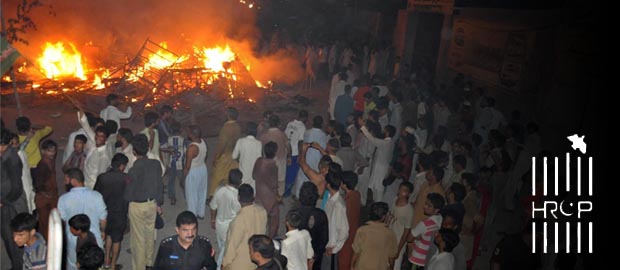The state is not a silent spectator, but an active participant in the persecution of Ahmadis, accused members of the Ahmadi community at a meeting organised by the Human Rights Commission of Pakistan (HRCP). The meeting was titled, ‘Ahmadi Citizens: dealing with discrimination, exclusion’ and was held at the Regent Plaza on Sunday.
“The persecution, these days, has taken a new trend as door-to-door conversions of people belonging to the faith are taking place where a cleric accompanies the area’s representatives and threats are meted out to people who refuse to give in to their demands,” claimed one participant.
There has been a change of attitude – what is seen as a change in the strategy of religious parties. “Previously, there used to be an abundance of court notices against us,” said Mujeebur Rehman, a member of the community and a lawyer by profession. “Now, these people pressurise the administration, whereupon the police do not protect us but are themselves in denial,” he claimed. “Even in court cases, bails are not granted as previously the clerics made a hue and cry after a decision of the high court and the order was reversed.” The worst that can happen to any community is when the doors of justice are closed to them, he said.
“The tolerance level among madrassah teachers is four per cent, as compared to the students which is 13 per cent. In Urdu medium schools, the tolerance among teachers is 17 per cent while among students, it is 47 per cent,” he said, referring to a book, titled ‘Study of Education, Inequality and Polarisation in Pakistan.’ According to Rehman, the discrepancy in these statistics lies because of the legal sanctions in place against Ahmadis. “It also shows that madrassa students are greatly affected. Work needs to be done on madrassa curriculum,” he said.
“The condition is not as grave in Sindh as we see in Punjab,” said another member of the community. Shahid Ataullah, another representative and an engineer by profession, remarked that this is also true because Punjab has a larger population of Ahmadis as compared to the rest of the country, but the state is indeed under pressure from clerics. “The general public is made to believe that we are traitors and are not reliable,” said Ataullah. “This paves the way to greater problems, which are escalating through individuals in the form of blasphemy charges,” said Ataullah.
Members of the community also narrated how three-day Qadyani courses were introduced that issued directives of killing them. Cursing Ahmadis within the premises of a mosque, as it doesn’t violate the sanctity of the mosque, is also part of these courses, said a member. Other than this, passport and CNIC issuance is yet another serious problem as the very mention of the word, Ahmadi, damages their their case.
With regards to problems in the educational fraternity, Rehman said that Ahmadi children are discriminated against, despite scoring high in examinations, as faith has to be declared in admission forms. “We had to withdraw from the matric board and get affiliated with the Aga Khan Board. But children who are not part of the Rabwah [the official community group] continue to face problems,” he said. Ataullah pointed out how online applications for colleges only provide the option of Muslim and Non-Muslim. “An affidavit is then required to be produced in hard copy to prove your faith. This causes psychological problems among our kids,” he said.
The community is also of the belief that the removal of objectives resolution and discriminatory clauses from the Constitution are key measures that can end the marginalisation of the Ahmadi community.

